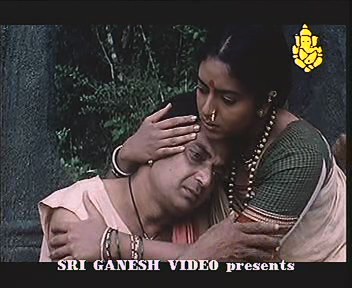 Dweepa (2002)
Dweepa (2002)Featuring: Soundarya, Avinash, Vasudeva Rao, Harish Raju and others.
Directed by: Girish Kasaravalli
Movies based on novels seldom go wrong in their execution. The deep rooted messages they give us leave lasting impressions on our mind. Girish Kasarvalli tactfully brings such a story to the celluloid in the form of ‘Dweepa’ that uses a mythological metaphor to send home a message.
Based on the original version by Na D’Souza, ‘Dweepa’ takes us immediately into the lives of a small family living on the beautiful paradise-like island in the heart of Karnataka. Embedded like a crowning jewel at the foot of a picturesque mountain called ‘Sita parvata’ the island is part of history. The history that is older than any of us or our ten generations in the past. It is believed that Rama and Sita used that mountain and its surrounding areas during their exile. The local folk also believe that an enraged villager’s spirit who killed an evil king is their God Almighty. This belief is so deep rooted that it refuses to change the old man’s mind when it is discovered that due to rising water levels, the island is bound to submerge sooner or later.
The old man (Vasudeva Rao) and his son Ganapaiah (Avinash) are the official ‘village welfare’ ritual holders. They perform a ritual called ‘nema’ which is supposed to invoke the villager-God and help people prosper in life. Nagi (Soundarya) is the dutiful wife of Ganapaiah who goes about being the sole person who keeps this family a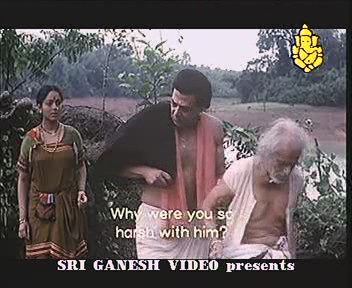 float. Literally, as it later turns out. When the island is informed about this soon-to-be-catastrophe, the wise people pack their boats and row away into grocery stores and other businesses. The old man, his son and daughter-in-law on the other hand have a more complex problem at hand. The government does not care about these handfuls of crumbling huts and hence does no more than fling a compensational fee at them and tell them to move. The island is everything the old man has for an identity. His life has been spent in that island performing the family tradition of ‘nema’ and nothing can compensate his life’s earnings. Despite the officers trying to help out the troubled family, the old man refuses to leave his roots to which his son tunes in as well.
float. Literally, as it later turns out. When the island is informed about this soon-to-be-catastrophe, the wise people pack their boats and row away into grocery stores and other businesses. The old man, his son and daughter-in-law on the other hand have a more complex problem at hand. The government does not care about these handfuls of crumbling huts and hence does no more than fling a compensational fee at them and tell them to move. The island is everything the old man has for an identity. His life has been spent in that island performing the family tradition of ‘nema’ and nothing can compensate his life’s earnings. Despite the officers trying to help out the troubled family, the old man refuses to leave his roots to which his son tunes in as well.
While this is the pickle this father-son duo is in, let us shift the scene now to Nagi. A confident woman with a heart of gold. She understands and appreciates the traditional connection they have with the village and its roots but she is the most practical person in that rather foolishly adamant family. She requests her father-in-law and husband several times to rethink their foolhardy decision but in vain.
One fine day, the policemen sent by the government drag the gritty old man out of his little hut and take him away from the village. But his roots are so deep that nothing helps keep him in one place and he returns back to the same village. Foreseeing more trouble ahead, Nagi’s mother recommends taking Krishna (Harish R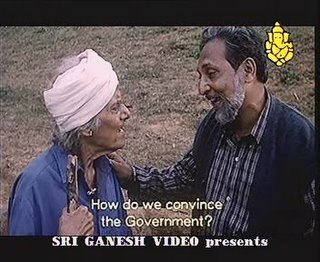 aju) as a helping hand in case things were to take a turn to the worse. With a stupid husband and an exceedingly rigid father-in-law Nagi accepts this offer and so we see the cheerful and spirited Krishna enter their lives.
aju) as a helping hand in case things were to take a turn to the worse. With a stupid husband and an exceedingly rigid father-in-law Nagi accepts this offer and so we see the cheerful and spirited Krishna enter their lives.
Krishna has had a rough streak. With a failed stint in Bombay he is looking for some place to hang on to so that he does not get labeled a loser. As he enters this small family the companionship between him and Nagi starts to pinch Ganapaiah in the eye. Nagi and Krishna are the only talking heads in this rather silent and hushed up family. According to Ganapaiah and his father, this cheer seems almost criminal in the face of the murder of their roots that is taking place. Nagi on the other hand is ready to move on. The old man finally gives up his life performing his last ‘nema’ at the temple shrine and this is the final nail in this drowning coffin.
With the old soul up in smoke, Ganapaiah slowly starts to lose his mind and what is left of his rather weak reasoning skills. Suspicion is the worst kind of demon there is between couples. Once this snake strikes one can be assured there will never really be complete healing. Unfortunately for Nagi, ironical to her name, it does. Ganapaiah tries his best to make sure that he conveys his malicious feelings towards Krishna. This even includes giving him dangerous assignments like herding a cow and her calf across an angry river. Nagi’s concern for Krishna is misinterpreted in all the possible ways that a gutless spouse can possibly do. When Nagi realizes that Ganapaiah has started withdrawing as a husband and a man, she lets Krishna go. Krishna, promptly, takes off with the only transportation mode they have – the boat.
Now…they are stranded on this drowning ship with a raging rain on on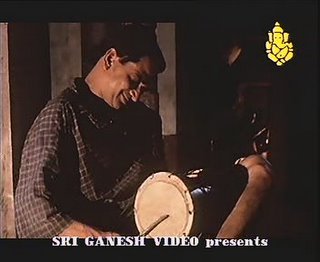 e hand and a roaring tiger (yes there is one on ‘Sita parvata’) on the other. While Ganapaiah is busy giving up on life altogether, Nagi fights against all odds to make sure they are safe. Her mental and physical abilities are put to test in the face of this Herculean challenge for survival. When we watch Nagi fighting everything from a clogged sludge to invisible man-eaters, we realize what a strong woman she is. One of the most brilliantly shot sequences in the movie is the final half an hour that showcases the struggle of an innocent woman.
e hand and a roaring tiger (yes there is one on ‘Sita parvata’) on the other. While Ganapaiah is busy giving up on life altogether, Nagi fights against all odds to make sure they are safe. Her mental and physical abilities are put to test in the face of this Herculean challenge for survival. When we watch Nagi fighting everything from a clogged sludge to invisible man-eaters, we realize what a strong woman she is. One of the most brilliantly shot sequences in the movie is the final half an hour that showcases the struggle of an innocent woman.
Every good book has a strong bottom-line. The final few pages. Those pages that you want to jump to but would not do it because it would break the rhythm of the narration. Hence, the final five minutes of the movie should not be written about or explained. I am going to let the viewer enjoy it and feel what I did. The battle of a woman’s inner and outer demons are beautifully underlined in the climax that leaves you with a dry and hollow feeling in your heart. Ah! What a fortune to be witness to such beautiful cinema.
Performances wise the show belongs to Soundarya without a close second. This was the first movie I saw afte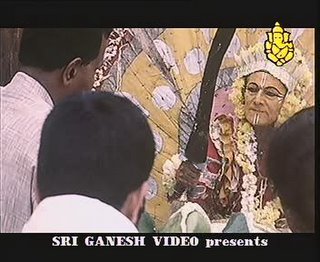 r she passed away and it sends a dagger to my heart at how God can be so cruel as to take away such a gifted performer and a wonderful individual from us. She brings a raw and real effect to the Nagi whose heart ends up becoming the ‘dweepa’ itself that no one can reach. Her simplistic and bulls eye portrayal leaves us yelling in silences for Nagi’s justice. It was absolutely a treat to watch Soundarya in such a deglamorised and authentic role. Thank you, Soundarya ji, for bringing us such splendor. We all will miss you for eternity. May the Almighty keep you close to Him. Amen.
r she passed away and it sends a dagger to my heart at how God can be so cruel as to take away such a gifted performer and a wonderful individual from us. She brings a raw and real effect to the Nagi whose heart ends up becoming the ‘dweepa’ itself that no one can reach. Her simplistic and bulls eye portrayal leaves us yelling in silences for Nagi’s justice. It was absolutely a treat to watch Soundarya in such a deglamorised and authentic role. Thank you, Soundarya ji, for bringing us such splendor. We all will miss you for eternity. May the Almighty keep you close to Him. Amen.
Avinash underplays his role wonderfully as the ‘I-don’t-know-how-else-to-live’ chicken of a husband who ends up praising the unseen God when she is right beside him. One can only hope that God produces less Ganapaiahs and definitely more Nagis in our generation. Vasudeva Rao is in full swing as the annoyed and distraught old man fighting to die in his roots if not live on it. Professionals like Mr.Rao will be sorely missed for the finesse they brought to the screen. Harish Raju does a very confident job as the confused and happy-go-lucky Krishna. Pitted against giants like Soundarya, Avinash and Vasudeva Rao he manages to maintain a steady performance. Given the right roles we might be looking at yet another horse for the long haul.
Technical aspects are brilliant. The cinematography by National Award winner H M Ramachandra is a visual celebration of Mother Nature and her many colors. The background score tugs at your heart with its deep rooted notes and timely pitches. Editing is sometimes a little blunt and tends to drag the movie at times. This slows the pace down a little bit but Girish Kasarvalli’s deft direction keeps it from falling apart.
On the whole ‘Dweepa’ is a wonderfully crafted masterpiece. Being Kasarvalli’s fifth National Award winning film, ‘Dweepa’ is a must-watch for people of all genres. Here is an exemplary model of what Kannada cinema is all about.
![]()
Based on the original version by Na D’Souza, ‘Dweepa’ takes us immediately into the lives of a small family living on the beautiful paradise-like island in the heart of Karnataka. Embedded like a crowning jewel at the foot of a picturesque mountain called ‘Sita parvata’ the island is part of history. The history that is older than any of us or our ten generations in the past. It is believed that Rama and Sita used that mountain and its surrounding areas during their exile. The local folk also believe that an enraged villager’s spirit who killed an evil king is their God Almighty. This belief is so deep rooted that it refuses to change the old man’s mind when it is discovered that due to rising water levels, the island is bound to submerge sooner or later.
The old man (Vasudeva Rao) and his son Ganapaiah (Avinash) are the official ‘village welfare’ ritual holders. They perform a ritual called ‘nema’ which is supposed to invoke the villager-God and help people prosper in life. Nagi (Soundarya) is the dutiful wife of Ganapaiah who goes about being the sole person who keeps this family a
 float. Literally, as it later turns out. When the island is informed about this soon-to-be-catastrophe, the wise people pack their boats and row away into grocery stores and other businesses. The old man, his son and daughter-in-law on the other hand have a more complex problem at hand. The government does not care about these handfuls of crumbling huts and hence does no more than fling a compensational fee at them and tell them to move. The island is everything the old man has for an identity. His life has been spent in that island performing the family tradition of ‘nema’ and nothing can compensate his life’s earnings. Despite the officers trying to help out the troubled family, the old man refuses to leave his roots to which his son tunes in as well.
float. Literally, as it later turns out. When the island is informed about this soon-to-be-catastrophe, the wise people pack their boats and row away into grocery stores and other businesses. The old man, his son and daughter-in-law on the other hand have a more complex problem at hand. The government does not care about these handfuls of crumbling huts and hence does no more than fling a compensational fee at them and tell them to move. The island is everything the old man has for an identity. His life has been spent in that island performing the family tradition of ‘nema’ and nothing can compensate his life’s earnings. Despite the officers trying to help out the troubled family, the old man refuses to leave his roots to which his son tunes in as well.While this is the pickle this father-son duo is in, let us shift the scene now to Nagi. A confident woman with a heart of gold. She understands and appreciates the traditional connection they have with the village and its roots but she is the most practical person in that rather foolishly adamant family. She requests her father-in-law and husband several times to rethink their foolhardy decision but in vain.
One fine day, the policemen sent by the government drag the gritty old man out of his little hut and take him away from the village. But his roots are so deep that nothing helps keep him in one place and he returns back to the same village. Foreseeing more trouble ahead, Nagi’s mother recommends taking Krishna (Harish R
 aju) as a helping hand in case things were to take a turn to the worse. With a stupid husband and an exceedingly rigid father-in-law Nagi accepts this offer and so we see the cheerful and spirited Krishna enter their lives.
aju) as a helping hand in case things were to take a turn to the worse. With a stupid husband and an exceedingly rigid father-in-law Nagi accepts this offer and so we see the cheerful and spirited Krishna enter their lives.Krishna has had a rough streak. With a failed stint in Bombay he is looking for some place to hang on to so that he does not get labeled a loser. As he enters this small family the companionship between him and Nagi starts to pinch Ganapaiah in the eye. Nagi and Krishna are the only talking heads in this rather silent and hushed up family. According to Ganapaiah and his father, this cheer seems almost criminal in the face of the murder of their roots that is taking place. Nagi on the other hand is ready to move on. The old man finally gives up his life performing his last ‘nema’ at the temple shrine and this is the final nail in this drowning coffin.
With the old soul up in smoke, Ganapaiah slowly starts to lose his mind and what is left of his rather weak reasoning skills. Suspicion is the worst kind of demon there is between couples. Once this snake strikes one can be assured there will never really be complete healing. Unfortunately for Nagi, ironical to her name, it does. Ganapaiah tries his best to make sure that he conveys his malicious feelings towards Krishna. This even includes giving him dangerous assignments like herding a cow and her calf across an angry river. Nagi’s concern for Krishna is misinterpreted in all the possible ways that a gutless spouse can possibly do. When Nagi realizes that Ganapaiah has started withdrawing as a husband and a man, she lets Krishna go. Krishna, promptly, takes off with the only transportation mode they have – the boat.
Now…they are stranded on this drowning ship with a raging rain on on
 e hand and a roaring tiger (yes there is one on ‘Sita parvata’) on the other. While Ganapaiah is busy giving up on life altogether, Nagi fights against all odds to make sure they are safe. Her mental and physical abilities are put to test in the face of this Herculean challenge for survival. When we watch Nagi fighting everything from a clogged sludge to invisible man-eaters, we realize what a strong woman she is. One of the most brilliantly shot sequences in the movie is the final half an hour that showcases the struggle of an innocent woman.
e hand and a roaring tiger (yes there is one on ‘Sita parvata’) on the other. While Ganapaiah is busy giving up on life altogether, Nagi fights against all odds to make sure they are safe. Her mental and physical abilities are put to test in the face of this Herculean challenge for survival. When we watch Nagi fighting everything from a clogged sludge to invisible man-eaters, we realize what a strong woman she is. One of the most brilliantly shot sequences in the movie is the final half an hour that showcases the struggle of an innocent woman.Every good book has a strong bottom-line. The final few pages. Those pages that you want to jump to but would not do it because it would break the rhythm of the narration. Hence, the final five minutes of the movie should not be written about or explained. I am going to let the viewer enjoy it and feel what I did. The battle of a woman’s inner and outer demons are beautifully underlined in the climax that leaves you with a dry and hollow feeling in your heart. Ah! What a fortune to be witness to such beautiful cinema.
Performances wise the show belongs to Soundarya without a close second. This was the first movie I saw afte
 r she passed away and it sends a dagger to my heart at how God can be so cruel as to take away such a gifted performer and a wonderful individual from us. She brings a raw and real effect to the Nagi whose heart ends up becoming the ‘dweepa’ itself that no one can reach. Her simplistic and bulls eye portrayal leaves us yelling in silences for Nagi’s justice. It was absolutely a treat to watch Soundarya in such a deglamorised and authentic role. Thank you, Soundarya ji, for bringing us such splendor. We all will miss you for eternity. May the Almighty keep you close to Him. Amen.
r she passed away and it sends a dagger to my heart at how God can be so cruel as to take away such a gifted performer and a wonderful individual from us. She brings a raw and real effect to the Nagi whose heart ends up becoming the ‘dweepa’ itself that no one can reach. Her simplistic and bulls eye portrayal leaves us yelling in silences for Nagi’s justice. It was absolutely a treat to watch Soundarya in such a deglamorised and authentic role. Thank you, Soundarya ji, for bringing us such splendor. We all will miss you for eternity. May the Almighty keep you close to Him. Amen.Avinash underplays his role wonderfully as the ‘I-don’t-know-how-else-to-live’ chicken of a husband who ends up praising the unseen God when she is right beside him. One can only hope that God produces less Ganapaiahs and definitely more Nagis in our generation. Vasudeva Rao is in full swing as the annoyed and distraught old man fighting to die in his roots if not live on it. Professionals like Mr.Rao will be sorely missed for the finesse they brought to the screen. Harish Raju does a very confident job as the confused and happy-go-lucky Krishna. Pitted against giants like Soundarya, Avinash and Vasudeva Rao he manages to maintain a steady performance. Given the right roles we might be looking at yet another horse for the long haul.
Technical aspects are brilliant. The cinematography by National Award winner H M Ramachandra is a visual celebration of Mother Nature and her many colors. The background score tugs at your heart with its deep rooted notes and timely pitches. Editing is sometimes a little blunt and tends to drag the movie at times. This slows the pace down a little bit but Girish Kasarvalli’s deft direction keeps it from falling apart.
On the whole ‘Dweepa’ is a wonderfully crafted masterpiece. Being Kasarvalli’s fifth National Award winning film, ‘Dweepa’ is a must-watch for people of all genres. Here is an exemplary model of what Kannada cinema is all about.
1 comment:
Very nice review. I am a movie lover, but don't understand kanda language. Nevertheless, after reading your review I got to see it. My friend gave me the CD long back, its time to use it. Thanks.
Post a Comment